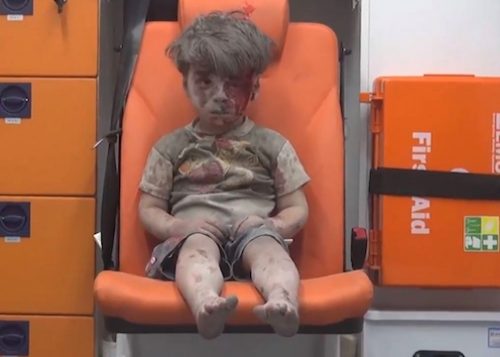His name is Omran. He sits motionless in an Aleppo ambulance after his family home was bombed. His silent stare screams at anyone looking: “I am a human being! Why can’t you see me?”

Omran’s is a photo that shows up throughout history, one we cannot ignore. Like the 1972 picture of the Vietnamese girl fleeing a napalm attack. Like Dorothea Lange’s 1936 photo of the Migrant Mother.
These images take us back to the basic fact that we are all one human family. They shock us, they demand our attention and, for at least a brief time, we grasp the basic reality — in spite of the wars or poverty that gave birth to these haunting images — that all of us are human beings and the suffering portrayed by these photos is simply wrong.
That, too, is the message of Catholic social teaching when it speaks about human solidarity. A good description of this virtue is found in a 1997 pastoral letter from the U.S. Catholic bishops: “Solidarity is action on behalf of the one human family, calling us to help overcome the divisions in our world. Solidarity binds the rich to the poor. It makes the free zealous for the cause of the oppressed. It drives the comfortable and secure to take risks for the victims of tyranny and war” (“Called to Global Solidarity,” 4).
Pope John Paul II had much to say on this topic. Noting that Christian solidarity is not just a feeling of pity, he referred to it as an enduring commitment to the good of every person and every nation because, as he stated, “We are all really responsible for all” (“On Social Concerns,” 38).
Many opportunities
How should we practice this global solidarity as presented in our church’s social teachings? How should we respond to the picture of Omran?

From our local perches and in the midst of our busy daily lives, this might seem like a super difficult task. How can we possibly make any difference regarding global issues, such as the war in Syria? Where are the handles for us to respond?
Two quick possibilities come to mind. The Mission Office of the Diocese of St. Cloud (http://mission.stcdio.org) often sponsors mission trips to partner dioceses overseas — great opportunities to spend valuable time with people in another land and culture. Catholic Relief Services also represents an excellent entry point for engaging solidarity. Check out its website to see the many options for working with them (www.crs.com).
Perhaps the most effective way to practice global solidarity is through our actions here at home. We have many new residents here in central Minnesota. Some are immigrants from other countries seeking better economic opportunities. Others are refugees from war-torn lands.
Whatever their reason for coming, they should expect the kind of hospitality that Jesus suggested in the Parable of the Last Judgment: Enter into the Kingdom that has been prepared for you, for I was a stranger and you welcomed me (Matthew 25:35).
Local event
This past year, a number of speakers in central Minnesota have sounded anything but welcoming, especially toward our Somali neighbors. Christians need to stand up to this hate-filled rhetoric against Muslim immigrants. One step in that direction is to meet our Muslim neighbors and to better understand them and their religion. There are various opportunities for us to do that.
One example is the Sept. 22 event at St. Joseph Church in St. Joseph (6 to 8 p.m., Heritage Hall). “Muslims and Christians Welcoming One Another as Neighbors” is an opportunity for Catholics and Protestants in St. Joseph to welcome new Muslim neighbors and to hear their stories. It is a simple event that can be replicated in other parishes but one with the potential for great impact. And, hopefully, it may help many of us to see Omran.
Bernie Evans is retired from St. John’s University School of Theology/Seminary in Collegeville, where he held the Virgil Michel Ecumenical Chair in Rural Social Ministries.






















